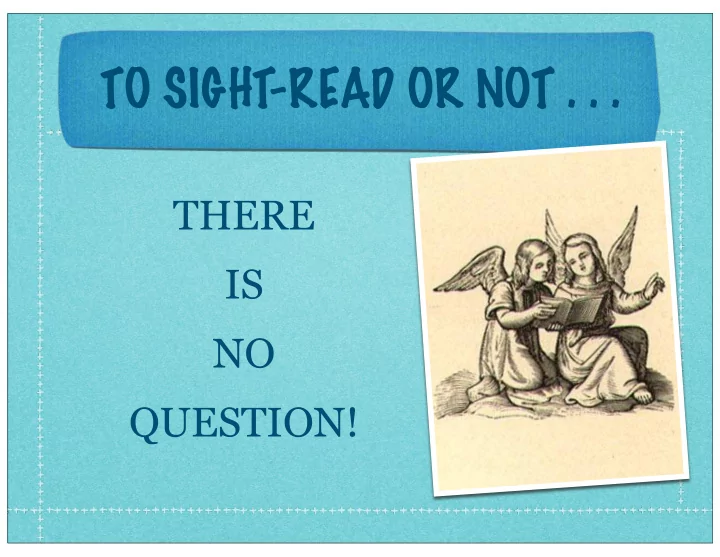

TO SIGHT-READ OR NOT . . . THERE IS NO QUESTION!
What YOU think they think of sight-reading.
What they REALLY think.
REASONS THEY HATE IT: “I can’t do it.” “It’s too difficult.” “I’m not good at it.” “Why bother when you just teach me the notes anyway?”
REASONS YOU HATE IT: “We don’t have time.” “They hate it.” “I always get angry when we do it.” “Why bother when I just teach them the notes anyway?”
So... JUST DIG IN AND GIVE THEM THE TOOLS TO SUCCEED.
Develop Reading in 3 Ways: Warmups Specific sight-reading exercises Rehearsing literature
Basic Philosophies Read EVERY day. Have realistic expectations. Keep it simple. Praise often! Keep it like a game. Move on before boredom and/or frustration set in.
I could talk about it or we could just do it. So . . . we’ll show you.
Don’t be upset! You get to try it too! Join your part circle!
OK. Let’s debrief.
In the warm-up Solfege exercises Hand signs Interval practice Solfege air-reading (beginners)
Singer Strategies Scan through and focus on the most complicated measures (“the ones with the most ink”). Point to the notes. Look ahead. Use good vocal technique.
Singer Strategies Keep “Do” “Mi” and “Sol” in your head. No matter what, don’t stop. Check for accidentals. Go slowly. It’s not a race. Don’t be afraid! Without you, it’s just ink and paper.
Reading Strategies Always precede reading with scale and triad. Note: Add plagal cadence (IV-I is hard to hear and often present in sight-reading). Sing examples on solfege. Use movable “do” so that they become aware of key relations. Insist on pointing. Encourage but don’t necessarily mandate hand-signs. Take a reasonable tempo, regardless of score indication.
Reading Strategies To gain independence from the piano, work ins this progression (depending on group level) •Play everything •Play strong beats only •Play beat 1 only •Reinforce only as needed in problem spots •Go for it a cappella
Teacher Strategies “Again,” with no judgements. They usually know EXACTLY what they did wrong. Let them just try again. Keep it light. Laugh if it goes badly! Anger won’t make them better at reading. They will be better if you are all relaxed. Praise often. Every success is a success. Don’t worry about lyrics. Let them focus on one thing and do it well.
Teacher Strategies Don’t beat a dead horse. Don’t rehearse reading. Move on if they don’t do it right. Spend 5 minutes on a reading exercise, and no more than 10 minutes on reading a rehearsal. Look back in time often and point progress out to your singers. Remember where you—and they— started. They WILL get better!
Ramping it up Make it musical! Add phrasing, articulation and dynamics. Point out sequential passages. Try the correct tempo. Add lyrics.
In Rehearsal . . . Rehearse in circles. The first time you teach a piece, treat it as sight- reading and do the same things (scale, triad, etc.) Lead them through either the whole thing or a section. Don’t stop.
In Rehearsal . . . Give them time to debrief in circles. Your leaders will generally do all the talking, so change it up from time to time and make everyone speak. They won’t be able to think as fast as you about theory. Be patient!
Success at CMEA There are two basic strategies: READ IT THROUGH or START AT THE END AND WORK BACKWARDS IN SECTIONS Either way, don’t stop but do ask them to note mistakes.
Success at CMEA Have a time-keeper (one of your strongest singers) so that you don’t have to stress about how much time you have left. Have them give you a 2-minute, then a 1-minute warning. Do the same things as you always do: scale, triad, IV-I cadence, and sing it on sol-fege. Make sure students are pointing and looking up once a measure at you.
Success at CMEA Conduct musically. Even if you haven’t been working on phrasing, this will show them what to do. DO. NOT. TALK. Let them sing! Keep to the 7-word rule. Practice a few pieces before you go using these techniques. Since you practice repertoire for CMEA, you should practice sight-reading too.
Your singers will be able to...
Get through a whole lot more music in rehearsal ...seriously. Be more independent Gain self-confidence Feel so incredibly accomplished. And...YOU WILL TEACH LESS FOR MORE RESULTS.
Resources Web-Based : •thesightreadingproject.com •smartmusic.com •sonicfit.com •sightreadingfactory.com •thepracticeroom.net ...and SO many more!!!
Resources Publications : • Successful Sight-singing: A Creative, Step by Step Approach , Nancy Telfer • Sight-Singing for SSA: A Practical Sight-Singing Course for Beginning and Intermediate Choirs , Joyce Eilers & Emily Crocker • Sing at First Sight , Andy Beck, Brian Lewis and Karen Farnum Surmani • 333 Elementary Exercises In Sight Singing (Kodaly) , ed. Percy Young ...and SO many more!!!
Lastly... They won’t be as good at it as your college group. GIVE. THEM. TIME! Be patient and have faith in them. It’s going to pay off!
Recommend
More recommend